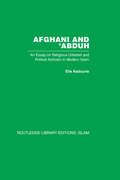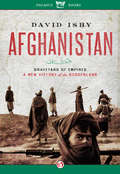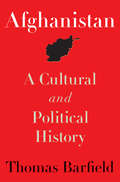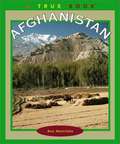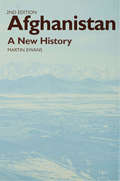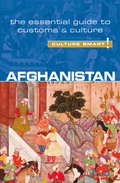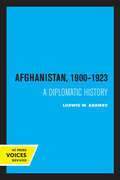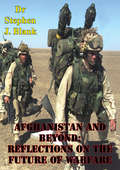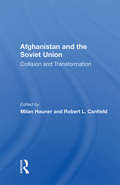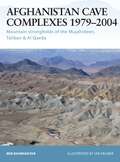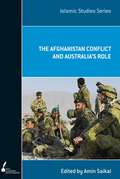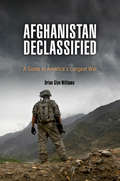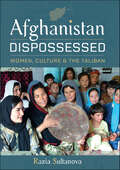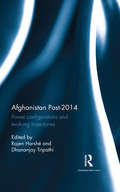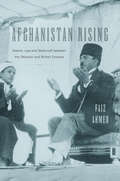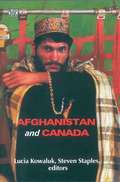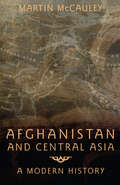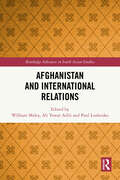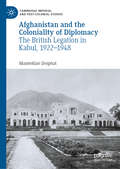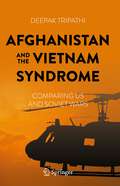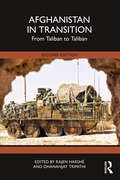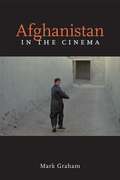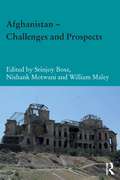- Table View
- List View
Afghani and 'Abduh: An Essay on Religious Unbelief and Political Activism in Modern Islam
by Elie KedourieFirst published in 2008. Routledge is an imprint of Taylor & Francis, an informa company.
Afghanistan
by David IsbyA startling history of modern Afghanistan--the story of a country caught in a vortex of terror Veteran defense analyst David Isby provides an insightful and meticulously researched look at the current situation in Afghanistan, her history, and what he believes must be done so that the U.S. and NATO coalition can succeed in what has historically been known as "the graveyard of empires." Afghanistan is one of the poorest countries in the world with one of the lowest literacy rates. It is rife with divisions between ethnic groups that dwarf current schisms in Iraq, along with conflicts between rogue factions from Pakistan, with whom relations are increasingly strained. The task of implementing an effective American policy and cementing Afghan rule is hampered by what Isby sees as separate but overlapping conflicts between terrorism, narcotics, and regional rivalries, each presenting separate yet equally challenging issues to resolve. This book provides the road map to overcoming these obstacles and finding a way forward for the U.S. and the Afghan nation.
Afghanistan
by Kim WhiteheadOver the past four decades, Afghanistan has been form apart by social unrest and civil war. Most recently, the harsh government of the Taliban, which ruled according to a strict interpretation of Islamic law, was overthrown by a U.S.-led invasion of the country in 2001. Since then foreign assistance has helped Afghanistan begin rebuilding, and the country has taken important steps toward democracy. Yet difficult problems remain. In parts of the country, for example, the elected government must still contend with various factions for actual control, and poverty and disease are widespread. This book examines the economic and political issues facing Afghanistan today. It provides up-to-date information about the country's geography and climate, history, society, important cities and communities, and relations with other countries. Founded in 1955, the Foreign Policy Research Institute (FPRI) is one of the nation's oldest "think tanks." It brings the insights of scholarship to bear on issues in American foreign policy. Through its Wachman Center, it promotes international and civic literacy in the classroom. FPRI's Wachman Center produces webcasts for students and conferences and lesson plans for teachers.
Afghanistan
by Thomas BarfieldAfghanistan traces the historic struggles and the changing nature of political authority in this volatile region of the world, from the Mughal Empire in the sixteenth century to the Taliban resurgence today. Thomas Barfield introduces readers to the bewildering diversity of tribal and ethnic groups in Afghanistan, explaining what unites them as Afghans despite the regional, cultural, and political differences that divide them. He shows how governing these peoples was relatively easy when power was concentrated in a small dynastic elite, but how this delicate political order broke down in the nineteenth and twentieth centuries when Afghanistan's rulers mobilized rural militias to expel first the British and later the Soviets. Armed insurgency proved remarkably successful against the foreign occupiers, but it also undermined the Afghan government's authority and rendered the country ever more difficult to govern as time passed. Barfield vividly describes how Afghanistan's armed factions plunged the country into a civil war, giving rise to clerical rule by the Taliban and Afghanistan's isolation from the world. He examines why the American invasion in the wake of September 11 toppled the Taliban so quickly, and how this easy victory lulled the United States into falsely believing that a viable state could be built just as easily. Afghanistan is essential reading for anyone who wants to understand how a land conquered and ruled by foreign dynasties for more than a thousand years became the "graveyard of empires" for the British and Soviets, and what the United States must do to avoid a similar fate.
Afghanistan (A True Book)
by Ann HeinrichsIdeal for today's young investigative reader, each A True Book includes lively sidebars, a glossary and index, plus a comprehensive "To Find Out More" section listing books, organizations, and Internet sites. A staple of library collections since the 1950s, the new A True Book series is the definitive nonfiction series for elementary school readers.
Afghanistan - A New History
by Robyn Carr Patrick Weber Martin Ewans Sir Martin EwansSir Martin Ewans, former Head of the British Chancery in Kabul, puts into an historical and contemporary context the series of tragic events that have impinged on Afghanistan in the past fifty years. The book examines the roots of these developments in Afghanistan's earlier history and external relationships, as well as their contemporary relevance
Afghanistan - Culture Smart!
by Moska Najib Nazes AfrozAfghanistan is situated at the crossroads of Asia, a strategically important location that connects the Middle East with Central Asia and the Indian subcontinent. Down the ages it has been subjected to continuous foreign invasion and intervention--from Alexander the Great to Genghis Khan, and as a pawn in the struggle between the British and Russian Empires--making its people wary of outsiders. That history is being repeated in the twenty-first century. Afghanistan has always been seen from the outside as a realm of much intrigue and many myths. The Afghans tried to keep their distance from the outside world--especially from the Europeans who, whether in pursuit of imperial goals or simply as explorer-travelers, attempted to enter and traverse the land. Their very elusiveness attracted Westerners to this landlocked country of high mountains and breathtaking beauty, where age-old customs and traditions were zealously guarded, sometimes at the cost of many lives. The Afghan people are a tapestry of ethnicities woven over time--Pashtuns, Tajiks, Hazaras, Uzbeks, and many smaller ones. Society is organized mainly along ethnic and tribal lines, but ethnic identity becomes irrelevant when a common enemy threatens to take control of the country. There are also many shared values and unwritten codes of conduct that govern interpersonal relations, which are not taken lightly. Visitors are struck by the simplicity, hospitability, dignity, and generosity of the Afghan people, and often confounded by customs that they find hard to understand. Culture Smart! Afghanistan is a unique introduction to the background, habits, traditions, idiosyncrasies, suspicions about foreigners, and patterns of behavior of the Afghan people. It offers visitors invaluable information and insights that will help them to interact with Afghans, to interpret their behavior, and to behave appropriately in their company, whether in personal or business exchanges. Once the ice is broken, the rewards will be great.
Afghanistan 1900 - 1923: A Diplomatic History
by Ludwig W. AdamecThis title is part of UC Press's Voices Revived program, which commemorates University of California Press’s mission to seek out and cultivate the brightest minds and give them voice, reach, and impact. Drawing on a backlist dating to 1893, Voices Revived makes high-quality, peer-reviewed scholarship accessible once again using print-on-demand technology. This title was originally published in 1967.
Afghanistan And Beyond: Reflections On The Future Of Warfare
by Dr Stephen J. BlankMany military analysts believe or fear that the wars of the 1990s will be akin to the wars in the former Yugoslavia: small-scale but long-lasting and recurrent ethnic wars that also elude easy international resolution. There are consequently well-founded concerns about prospects for deployment of U.S. forces there in a unilateral or U.N. capacity. Some of the lessons of this kind of war were already apparent in the wars of the 1980s. They were known then as low-intensity conflicts and now as operations other than, or short of, war.This report focuses mainly on lessons from one of the most crucial of these wars, i.e., in Afghanistan as a result of the Soviet invasion in 1979, and attempts to draw lessons that are relevant for current wars, like those in Yugoslavia or the ex-Soviet Union. The purpose is to stimulate analysis and reflection on the strategic and operational, if not also tactical nature of these wars by both analysts and policymakers so that all interested groups can more easily come to terms with a form of warfare that promises to be both deeply destructive and deeply rooted in longstanding political and social antagonisms that cannot be easily or quickly resolved.Naturally some of the lessons drawn from Afghanistan and other wars may either only apply to Russian and Soviet forces or conversely may apply to war in general. But our primary intention is to make a contribution to the study of future wars particularly of the ethnic and small-scale type that promise to continue in many parts of the globe lest we devise better ways for averting and then resolving them.
Afghanistan And The Soviet Union: Collision And Transformation
by Milan HaunerSince the dramatic events of a decade ago-the revolutions in Kabul and Teheran, the Soviet invasion of Afghanistan, and the Gulf War- "Greater Central Asia" has recaptured the imagination of academia. Historians, Islamicists, anthropologists, political scientists, and defense analysts began to convene conferences and to produce collective volumes that concentrated on two seemingly unrelated subjects: the continuity and strength of ethnocultural patterns in Muslim Central Asia, on the one hand, and the limited range of U.S. military options for defense of the oil-rich Gulf region against hypothetical Soviet invasion, on the other. The contributors to this volume were asked to focus on the long term significance of the junction between Afghanistan and Soviet Eurasia through the "Midlands" region-a relationship that could have wide implications.
Afghanistan Cave Complexes 1979-2004
by Ian Palmer Mir BahmanyarFollowing the Soviet invasion in 1979, the Mujahideen defenders of Afghanistan developed and reinforced many natural cave systems to use as supply bases and defensive positions. The Taliban and Al Qaeda further strengthened these positions in the 1990s. Following the events of September 11, 2001, these cave systems have once more come to prominence and sites such as Tora Bora and Zhawar Kili have featured in news headlines around the world. This title provides an analysis of these caves and underground systems, and discusses the U.S.-led Coalition's tactical approach to dislodging the enemy from these fortified positions.
Afghanistan Conflict and Australia's Role (Islamic Studies Series)
by Amin SaikalA decade after the US-led invasion of Afghanistan in October 2001, the country continues to face a growing insurgency and crises of governance. The Afghanistan Conflict and Australia's Role tackles a number of critical dimensions-politics, society, military, and reconstruction-of this conflict from a range of perspectives.This book unpacks the nature and complexity of the conflict at national and international levels. It makes a critical assessment of the performance of President Hamid Karzai and his government, and the efforts made by the international community, the US and its NATO and non-NATO allies in particular, to stabilise, rebuild and secure Afghanistan as a viable state. In addition, it examines critically the role played by Australia in the conflict.The conclusions are far-reaching, with relevance to anyone interested in the interconnectedness of many contemporary issues-governance, democratisation, development, the role of the media, and counterinsurgency. Islamic Studies Series - Volume 8
Afghanistan Declassified
by Brian Glyn WilliamsNearly 100,000 U.S. soldiers are deployed to Afghanistan, fighting the longest war in the nation's history. But what do Americans know about the land where this conflict is taking place? Many have come to have a grasp of the people, history, and geography of Iraq, but Afghanistan remains a mystery.Originally published by the U.S. Army to provide an overview of the country's terrain, ethnic groups, and history for American troops and now updated and expanded for the general public, Afghanistan Declassified fills in these gaps. Historian Brian Glyn Williams, who has traveled to Afghanistan frequently over the past decade, provides essential background to the war, tracing the rise, fall, and reemergence of the Taliban. Special sections deal with topics such as the CIA's Predator drone campaign in the Pakistani tribal zones, the spread of suicide bombing from Iraq to the Afghan theater of operations, and comparisons between the Soviet and U.S. experiences in Afghanistan.To Williams, a historian of Central Asia, Afghanistan is not merely a theater in the war on terror. It is a primeval, exciting, and beautiful land; not only a place of danger and turmoil but also one of hospitable villagers and stunning landscapes, of great cultural diversity and richness. Williams brings the country to life through his own travel experiences--from living with Northern Alliance Uzbek warlords to working on a major NATO base. National heroes are introduced, Afghanistan's varied ethnic groups are explored, key battles--both ancient and current--are retold, and this land that many see as only a frightening setting for prolonged war emerges in three dimensions.
Afghanistan Dispossessed: Women, Culture & the Taliban
by Razia SultanovaA focused history of women and popular culture in Afghanistan from the Soviet invasion, to 9/11, to the Taliban's takeover.How does normal social, cultural, religious life survive in constant turmoil? How can the people flourish? These basic questions are examined and answered by Razia Sultanova's academic analysis and deep fieldwork, with extensive eyewitness and personal contacts and conversations with a wide variety of Afghan men and women. She looks at basic questions of gender, identity, nation, tradition, history, popular culture and especially the role of music - classical, popular, modern and contemporary - as a vital element for survival. And all is over-shadowed by the Taliban with on-going threat of terror and repression especially for women and girls. Here is a classical story of a people's struggle for everyday normality and preservation of cherished traditions in a war-torn society.
Afghanistan Post-2014: Power configurations and evolving trajectories
by Rajen Harshé Dhananjay TripathiOwing to its geo-strategic location and mineral wealth, Afghanistan has acquired significance in the inter-state politics of Asia as well as world politics during the past decades. This book outlines Afghanistan's efforts to build a stable and peaceful democratic polity, with external military support from the United States and its NATO allies. It also analyses the nation's development initiatives with major powers such as India, the United States, Russia and Germany. The volume: * brings to the fore ongoing tensions within the Afghan polity and its continued impact on Asian/world politics; * discusses topical themes such as withdrawal of US troops and non-traditional security; and * presents perspectives from scholars and experts from around the world, including Afghans. This work will be useful to scholars and researchers in political science, international relations, sociology, area studies, and the interested general reader.
Afghanistan Remembers
by Parin DossaAlthough extensive literature exists on the violence of war, little attention has been given to the ways in which this violence becomes entrenched and normalized in the inner recesses of everyday life. In Afghanistan Remembers, Parin Dossa examines Afghan women's recall of violence through memories and food practices in their homeland and its diaspora. Her work reveals how the suffering and trauma of violence has been rendered socially invisible following decades of life in a war-zone.Dossa argues that it is necessary to acknowledge the impact of violence on the familial lives of Afghan women along with their attempts at recovery under difficult circumstances. Informed by Dossa's own story of family migration and loss, Afghanistan Remembers is a poignant ethnographic account of the trauma of war. She calls on the reader to recognize and bear witness to the impact of deeper forms of violence.
Afghanistan Rising: Islamic Law and Statecraft between the Ottoman and British Empires
by Faiz AhmedDebunking conventional narratives, Faiz Ahmed presents a vibrant account of the first Muslim-majority country to gain independence, codify its own laws, and ratify a constitution after the fall of the Ottoman Empire. Afghanistan, he shows, attracted thinkers eager to craft a modern state within the interpretive traditions of Islamic law and ethics.
Afghanistan and Canada
by Lucia Kowaluk Steven StaplesThousands of foreign troops have been fighting a seemingly endless war in Afghanistan. Billions of dollars of foreign aid have been poured into the country. Thousands of military and civilian causalities are the tragic human cost. International observers report that corruption is rampant. A new Taliban insurgency is active. In Canada an unprecedented public concern has emerged; a majority of Canadians want to end Canada's currently defined military involvement there.A number of Canada's top political analysts have contributed essays, including Peggy Mason, Linda McQuaig, Michael Neumann, James Laxer, Murray Dobbin, and Michael Byers.Lyle Stewart is a journalist who has worked for the Montreal Gazette and the CBC.
Afghanistan and Central Asia: A Modern History
by Martin MccauleyThe Afghan crisis has grabbed the attention of the entire world, and underlined the desperate need in the West for a better understanding of the region and its challenges in the face of increasingly militant interpretations of Islam. Carved up and fought over by the British and Tsarist Russia in the nineteenth century, and under Soviet domination for much of the twentieth, the lonely passes, deserts and peoples of the five Central Asian republics have remained shrouded in obscurity. Even Afghanistan, the site of almost constant conflict since the Soviet invasion of 1978, is little known beyond the media images of the Islamic fundamentalist Taliban movement. Martin McCauley draws on his vast knowledge of the region and its history to provide a clear and highly readable account of Afghanistan and the Central Asian republics of Kazakhstan, Kyrgyzstan, Tasikistan, Turkmenistan, Uzbekistan, from their medieval pasts to the unpredictable present. Illuminating languages and landscapes, cultures and society, he examines the rise of militant Islam and its impact on the region, the push and pull of global economics and politics, and possibilities for stability in an inherently unstable part of the world.
Afghanistan and International Relations (Routledge Advances in South Asian Studies)
by William Maley Paul Lushenko Ali Yawar AdiliThis book explores various dimensions of recent international relations scholarship, taking the case of Afghanistan as a point of departure for discussion of these different themes.Contributors investigate a broad range of topics, including international relations theory, the nature of global order, ‘othering’ discourses, diplomacy, international law, the transformation of war, terrorism, gender politics, social media, state building, democratisation, refugee movements, globalisation, and historical lessons. The Afghanistan case helps illuminate the complexities of all these areas of analysis, and the book takes the analysis of Afghanistan in new directions. Theoretically, the authors interrogate the Afghanistan case’s implications for international relations, and vice-versa, by integrating multiple and complementary global or structural, state or institutional, and behaviouralist or leader-centric lenses. Conceptually, the chapters bridge the gap between theory and practice, thus reflecting the emergence of a problem-oriented approach to international relations scholarship. Methodologically, the research design employed by the authors is best characterised as ‘analytical eclecticism’. The majority of contributors originate from Afghanistan, something which again makes this book notable, and all three editors have extensive experience from time spent in Afghanistan.Using the Afghan case to explicate the importance of the relevance of theory and its related concepts to international relations studies, this book will be of interest to researchers in the field of international relations, Asian and Middle East Studies.
Afghanistan and the Coloniality of Diplomacy: The British Legation in Kabul, 1922–1948 (Cambridge Imperial and Post-Colonial Studies Series)
by Maximilian DrephalThis book offers an institutional history of the British Legation in Kabul, which was established in response to the independence of Afghanistan in 1919. It contextualises this diplomatic mission in the wider remit of Anglo-Afghan relations and diplomacy from the nineteenth to the twenty-first century, examining the networks of family and profession that established the institution’s colonial foundations and its connections across South Asia and the Indian Ocean. The study presents the British Legation as a late imperial institution, which materialised colonialism's governmental practices in the age of independence. Ultimately, it demonstrates the continuation of asymmetries forged in the Anglo-Afghan encounter and shows how these were transformed into instances of diplomatic inequality in the realm of international relations. Approaching diplomacy through the themes of performance, the body and architecture, and in the context of knowledge transfers, this work offers new perspectives on international relations through a cultural history of diplomacy.
Afghanistan and the Vietnam Syndrome: Comparing US and Soviet Wars
by Deepak TripathiGreat powers have often found that military adventurism to force their will in distant lands comes with the risk of spending excessive military, economic, and moral capital to the extent that war is no longer sustainable. Written by a former BBC Afghanistan correspondent who set up the corporation’s bureau in Kabul in the early 1990s, this book draws both from scholarly knowledge as well as first-hand insights on how the Americans met that fate in Vietnam, and the Soviets and Americans in Afghanistan. America’s 1975 retreat from Vietnam was a consequential event, prompting US commentators to explain it as reluctance to get involved in foreign wars, a mindset described as the Vietnam Syndrome. As Deepak Tripathi points out, the Vietnam experience made the Americans determined to give the Soviets their own Vietnam. The 1979 Soviet invasion of Afghanistan, and retreat after a decade of occupation, represented the revenge America sought. However, President George W. Bush’s decision to invade Afghanistan after the 9/11 attacks was the beginning of a long military venture that ended in retreat in 2021. Addressing an academic as well as a general audience, Tripathi explores parallels between wars in Afghanistan and Vietnam, and shows how the United States and the Soviet Union met the same fate.
Afghanistan in Transition: From Taliban to Taliban
by Rajen Harshé Dhananjay TripathiOwing to its geo-strategic location and mineral wealth, Afghanistan has acquired significance in the inter-state politics of Asia as well as world politics during the past decades. This book discusses the Taliban’s return which outlines the recent and current developments in contemporary Afghanistan. The essays in this volume: Locate Afghanistan under globalisation and reflect on the state and nation-building efforts in Afghanistan by shedding light on the status of citizens, especially women Analyse how the Taliban survived in all these years, and how it returned to power Examine Afghanistan’s relations with major powers like the USA, China, and India and explore the intricacies of ties between India, Pakistan, and Afghanistan within the Indian subcontinent Shedding light on a threshold moment in 21st Century world politics, this work will be useful to scholars and researchers in political science, international relations, sociology, area studies, and the interested general reader.
Afghanistan in the Cinema
by Mark GrahamIn this timely critical introduction to the representation of Afghanistan in film, Mark Graham examines the often surprising combination of propaganda and poetry in films made in Hollywood and the East. Through the lenses of postcolonial theory and historical reassessment, Graham analyzes what these films say about Afghanistan, Islam, and the West and argues that they are integral tools for forming discourse on Afghanistan, a means for understanding and avoiding past mistakes, and symbols of the country's shaky but promising future. Thoughtfully addressing many of the misperceptions about Afghanistan perpetuated in the West, Afghanistan in the Cinema incorporates incisive analysis of the market factors, funding sources, and political agendas that have shaped the films. The book considers a range of films, beginning with the 1970s epics The Man Who Would Become King and The Horsemen and following the shifts in representation of the Muslim world during the Russian War in films such as The Beast and Rambo III. Graham then moves on to Taliban-era films such as Kandahar, Osama, and Ellipsis, the first Afghan film directed by a woman. Lastly, the book discusses imperialist nostalgia in films such as Charlie Wilson's War and destabilizing visions represented in contemporary works such as The Kite Runner.
Afghanistan – Challenges and Prospects: Summary Report (Durham Modern Middle East and Islamic World Series)
by Srinjoy Bose, Nishank Motwani and William MaleyAfter decades of turmoil a new phase is opening up for Afghanistan, in which a new generation comes to the fore as many of the key players from earlier phases, including foreign interventionist powers, leave the scene. Although this new phase offers new possibilities and increased hope for Afghanistan’s future, the huge problems created in earlier phases remain. This book presents a comprehensive overall assessment of the current state of politics and society in Afghanistan, outlining the difficulties and discussing the future possibilities. Many of the contributors are Afghans or Afghan insiders, who are able to put forward a much richer view of the situation than outside foreign observers.
